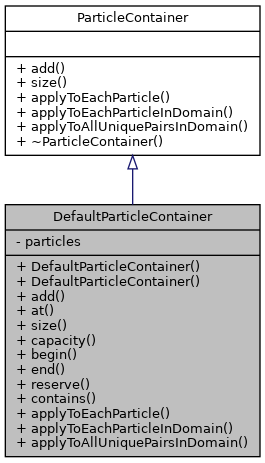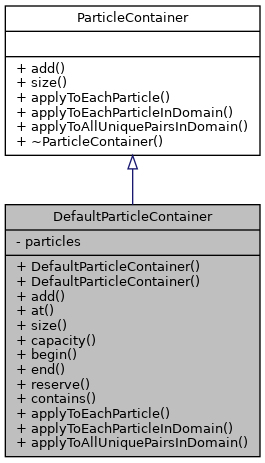Container to store the particles for simulation using the direct sum algorithm. More...
#include <DefaultParticleContainer.h>


Public Member Functions | |
| DefaultParticleContainer ()=default | |
| DefaultParticleContainer (size_t capacity) | |
| Create a ParticleContainer which can store up to capacity particles. More... | |
| void | add (Particle &p) override |
| Add one particle to this container. More... | |
| Particle & | at (size_t i) |
| Obtain particle at position i. More... | |
| size_t | size () const override |
| Retrieve the size of the data structure. More... | |
| size_t | capacity () |
| Retrieve the capacity of this container. More... | |
| std::vector< Particle >::iterator | begin () |
| Obtain an iterator to the first particle in this container. More... | |
| std::vector< Particle >::iterator | end () |
| Obtain an iterator to the last element of this container. More... | |
| void | reserve (size_t n) |
| Used to reserve the capacity of the vector used to storing particles. More... | |
| bool | contains (Particle &p) |
| Check, if this particle container contains an particle p' that equals p. More... | |
| void | applyToEachParticle (const std::function< void(Particle &)> &function) override |
| Iterate over all particles in this container and apply a lambda function to them. More... | |
| void | applyToEachParticleInDomain (const std::function< void(Particle &)> &function) override |
| Iterate over all particles that are part of the domain and apply a lambda function to them. For this container this method does the same as applyToEachParticle(), because every particle is in the simulation domain. More... | |
| void | applyToAllUniquePairsInDomain (const std::function< void(Particle &, Particle &)> &function) override |
| Iterate over all unique pairs of particles being part of the simulation domain (in this container all particles) and apply a lambda function to them. More... | |
 Public Member Functions inherited from ParticleContainer Public Member Functions inherited from ParticleContainer | |
| virtual | ~ParticleContainer ()=default |
| Virtual default constructor to guarantee appropriate memory clean up. More... | |
Private Attributes | |
| std::vector< Particle > | particles |
Detailed Description
Container to store the particles for simulation using the direct sum algorithm.
The storage of the particles is based on std::vector. This guarantees fast iteration over the particles, because they are stored consecutively in memory.
Constructor & Destructor Documentation
◆ DefaultParticleContainer() [1/2]
|
default |
◆ DefaultParticleContainer() [2/2]
|
explicit |
Create a ParticleContainer which can store up to capacity particles.
- Parameters
-
capacity If the capacity is exceeded the whole data structure will be extended leading to reallocation.

Member Function Documentation
◆ add()
|
overridevirtual |
Add one particle to this container.
- Parameters
-
p Particle to be added to this container.
Add one particle to this container. It will be appended.
Implements ParticleContainer.
◆ applyToAllUniquePairsInDomain()
|
overridevirtual |
Iterate over all unique pairs of particles being part of the simulation domain (in this container all particles) and apply a lambda function to them.
- Parameters
-
function Lambda function that is applied to each unique pair of particles.
The purpose of this function is provide an easy way of calculating the force between all particles by using Newton's third law of motion.
Implements ParticleContainer.
◆ applyToEachParticle()
|
overridevirtual |
Iterate over all particles in this container and apply a lambda function to them.
- Parameters
-
function Lambda function that is applied to each particle.
Implements ParticleContainer.

◆ applyToEachParticleInDomain()
|
overridevirtual |
Iterate over all particles that are part of the domain and apply a lambda function to them. For this container this method does the same as applyToEachParticle(), because every particle is in the simulation domain.
- Parameters
-
function Lambda function that is applied to each particle.
Implements ParticleContainer.

◆ at()
| Particle & DefaultParticleContainer::at | ( | size_t | i | ) |
◆ begin()
| std::vector< Particle >::iterator DefaultParticleContainer::begin | ( | ) |
Obtain an iterator to the first particle in this container.
- Returns
- Iterator to first particle in this container.
Obtain an iterator to the first particle in this container.
◆ capacity()
| size_t DefaultParticleContainer::capacity | ( | ) |
Retrieve the capacity of this container.
- Returns
- Capacity of this container.
The capacity of this container is the number of particles which can be stored, before the data structure has to be extended.

◆ contains()
| bool DefaultParticleContainer::contains | ( | Particle & | p | ) |
Check, if this particle container contains an particle p' that equals p.
- Parameters
-
p Particle to look for
- Returns
- true, if this particle container contains some particle p' that equals p, false otherwise.
This method should only be used for testing purposes in small instances, because the implementation is not that efficient.
◆ end()
| std::vector< Particle >::iterator DefaultParticleContainer::end | ( | ) |
Obtain an iterator to the last element of this container.
- Returns
- Iterator to last element of this container.
Obtain an iterator to the last element of this container.
◆ reserve()
| void DefaultParticleContainer::reserve | ( | size_t | n | ) |
Used to reserve the capacity of the vector used to storing particles.
- Parameters
-
n desired size
◆ size()
|
overridevirtual |
Retrieve the size of the data structure.
- Returns
- Number of particles in this container.
Provides the number of particles currently stored in the data structure.
Implements ParticleContainer.
Member Data Documentation
◆ particles
|
private |
The documentation for this class was generated from the following files:
- /home/runner/work/MolSim/MolSim/src/particleRepresentation/container/defaultParticleContainer/DefaultParticleContainer.h
- /home/runner/work/MolSim/MolSim/src/particleRepresentation/container/defaultParticleContainer/DefaultParticleContainer.cpp